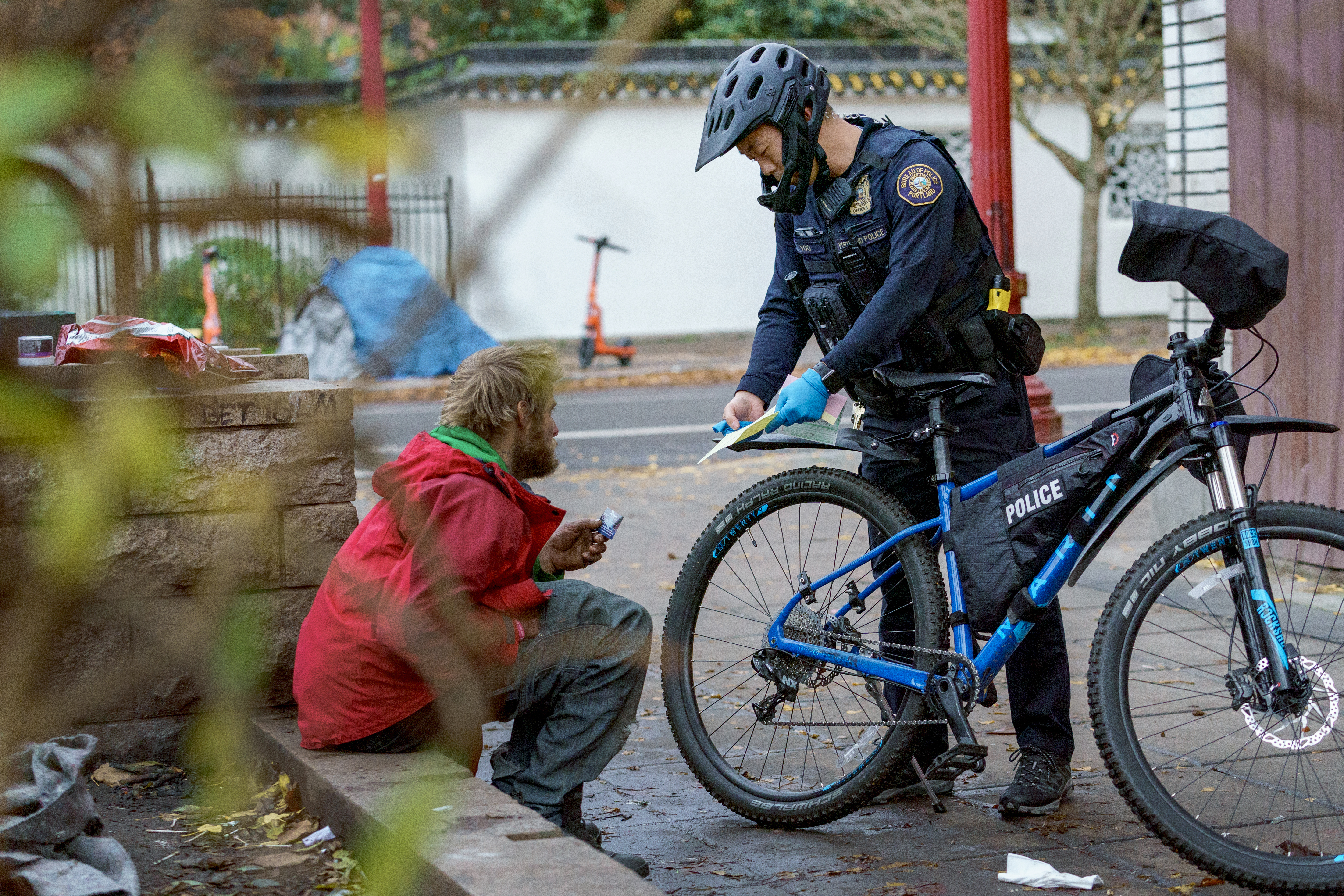
Portland Police central bike squad officer Joey Yoo issues a citation for drug possession in the city’s Old Town neighborhood in downtown Portland, Ore., Nov. 15, 2023.
Kristyna Wentz-Graff / OPB
Portland Police Chief Robert Day unveiled the step-by-step process that police in Oregon’s largest city will follow as they attempt to get drug users access to treatment programs after drugs are criminalized once again this weekend.
Day said that while officers would make every attempt to get people connected with treatment providers, he conceded many would also go to jail and warned that “there’s a high likelihood there will be uses of force involved” during arrests of a high-risk population.
“There’s risk involved with using law enforcement now to step into this space that it has not been in for several years,” Day said during Friday’s news conference at Portland Police Central Precinct, just days before a new law rolling back the state’s pioneering drug decriminalization law, Measure 110, goes into effect Sept. 1.
Under House Bill 4002, people caught with possession of a controlled substance can be charged with a misdemeanor. The debate surrounding the role of the criminal justice system should play in addressing addiction dominated this year’s short session. Opponents argue the new law will lead to more criminal charges and incarcerations, particularly for people of color in Oregon. Law enforcement lobbied for the new criminal penalties.
“There’s a high likelihood that people may have medical conditions that could lead to serious reactions, maybe even death in custody, that we cannot anticipate because of all of the unknowns associated with illegal narcotics use,” Day said.

Portland Police Chief Robert Day unveiled the step-by-step process that police in Oregon’s largest city will follow as they attempt to get drug users access to treatment programs once drugs are criminalized once again Sept 1.
Conrad Wilson / OPB
The new law also provides avenues for counties to get people into treatment, and out of the criminal justice system, by establishing deflection programs, collaborations between law enforcement and behavioral health entities.
The process of designing a deflection program in Multnomah County has been challenging, and deeply political. The county rolled back plans for a deflection drop off center for police last week and will instead offer mobile outreach, where police will call drug treatment providers to the scene.
According to the process laid out in a memo Day sent to Bureau staff Thursday, a police officer will determine deflection eligibility only between the hours of 8 a.m. and 8 p.m, Monday through Friday.
Officers will consider a number of factors: including if the individual is in possession of a small amount of hard drugs and “has been or could be arrested for misdemeanor possession of a controlled substance with no additional charges, warrants or holds,” according to the memo. The person must also be 18-years or older, “able to respond to verbal prompts” and willing to enter deflection.
Day said Portland Police will call deflection dispatch, which will send peer support services and providers to the scene and wait up to 30 minutes for them to arrive. While they wait, he said people will be arrested and held in handcuffs.
“We have a phone number,” Day said Friday. “We’re going to call it and if they’re not able to deliver, they’re not able to participate, the person’s going to go to jail. So that’s the best I can do right now.”
Someone would be considered ineligible if they’re deemed a “danger to themselves or others,” are actively talking about self-harm or are unable to understand “basic instructions.” If the individual needs immediate medical attention, they will be rerouted for hospital transport.
Day’s memo to Portland police also includes a “suggested deflection script” for officers to follow.
“You qualify for the Multnomah County Deflection Program, which means that you have 2 choices,” the script reads. “I can either take you to jail OR I can connect you with a person who has experienced addiction or is now in recovery.”
The suggested script concludes: “How would you like to proceed? Jail or talk to a peer provider?”
Day also noted during Friday’s press conference that many will likely be ineligible for the program, due to the criteria laid out by the county.
“The criteria is very narrow to meet deflection, right?” Day said. “No other charges, no warrants, no violent behavior, medically stable. I mean, this is going to be a very, very narrow window. I have low expectations that we’re going to see tons and tons of folks. We may see more people taken into custody.”
“At this point, we don’t really know what the numbers are gonna look like. All of this is going to be an adjustment in terms of how many people are taken in custody.”


